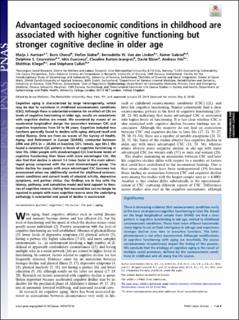Please use this identifier to cite or link to this item:
https://doi.org/10.21256/zhaw-3361| Publication type: | Article in scientific journal |
| Type of review: | Peer review (publication) |
| Title: | Advantaged socioeconomic conditions in childhood are associated with higher cognitive functioning but stronger cognitive decline in older age |
| Authors: | Aartsen, Marja J. Cheval, Boris Sieber, Stefan Van der Linden, Bernadette W. Gabriel, Rainer Courvoisier, Delphine S. Guessous, Idris Burton-Jeangros, Claudine Blane, David Ihle, Andreas Kliegel, Matthias Cullati, Stéphane |
| DOI: | 10.21256/zhaw-3361 10.1073/pnas.1807679116 |
| Published in: | Proceedings of the National Academy of Sciences of the United States of America |
| Page(s): | 201807679 |
| Issue Date: | 2019 |
| Publisher / Ed. Institution: | National Academy of Sciences |
| ISSN: | 0027-8424 1091-6490 |
| Language: | English |
| Subjects: | Socioeconomic position; Cognition; Life course; Life span; Aging |
| Subject (DDC): | 155: Differential and developmental psychology 305: Groups (age, origine, gender, income) |
| Abstract: | Cognitive aging is characterized by large heterogeneity, which may be due to variations in childhood socio-economic conditions (CSC). Although there is substantial evidence for an effect of CSC on levels of cognitive functioning at older age, results on associations with cognitive decline are mixed. We examined by means of an accelerated longitudinal design the association between CSC and cognitive trajectories from 50 to 96 years. Cognition included two functions generally found to decline with aging: delayed recall and verbal fluency. Data are from six waves of the Survey of Health, Aging, and Retirement in Europe (SHARE), conducted between 2004 and 2015 (n = 24,066 at baseline; 56% female, age 50+). We found a consistent CSC pattern in levels of cognitive functioning in later life. Older people with disadvantaged CSC had lower levels of cognitive functioning than those with more advantaged CSC. We also find that decline is almost 1.6 times faster in the most advantaged group compared with the most disadvantaged group. The faster decline for people with more advantaged CSC becomes less pronounced when we additionally control for adulthood socio-economic conditions and current levels of physical activity, depressive symptoms, and partner status. Our findings are in line with the latency, pathway, and cumulative model and lend support to theories of cognitive reserve, stating that neuronal loss can no longer be repaired in people with more cognitive reserve once the underlying pathology is substantial and speed of decline is accelerated. |
| URI: | https://digitalcollection.zhaw.ch/handle/11475/15720 |
| Fulltext version: | Published version |
| License (according to publishing contract): | CC BY-NC-ND 4.0: Attribution - Non commercial - No derivatives 4.0 International |
| Departement: | Social Work |
| Organisational Unit: | Institute of Diversity and Social Integration (IVGT) |
| Appears in collections: | Publikationen Soziale Arbeit |
Files in This Item:
| File | Description | Size | Format | |
|---|---|---|---|---|
| 1807679116.full.pdf | 566.07 kB | Adobe PDF |  View/Open |
Show full item record
Aartsen, M. J., Cheval, B., Sieber, S., Van der Linden, B. W., Gabriel, R., Courvoisier, D. S., Guessous, I., Burton-Jeangros, C., Blane, D., Ihle, A., Kliegel, M., & Cullati, S. (2019). Advantaged socioeconomic conditions in childhood are associated with higher cognitive functioning but stronger cognitive decline in older age. Proceedings of the National Academy of Sciences of the United States of America, 201807679. https://doi.org/10.21256/zhaw-3361
Aartsen, M.J. et al. (2019) ‘Advantaged socioeconomic conditions in childhood are associated with higher cognitive functioning but stronger cognitive decline in older age’, Proceedings of the National Academy of Sciences of the United States of America, p. 201807679. Available at: https://doi.org/10.21256/zhaw-3361.
M. J. Aartsen et al., “Advantaged socioeconomic conditions in childhood are associated with higher cognitive functioning but stronger cognitive decline in older age,” Proceedings of the National Academy of Sciences of the United States of America, p. 201807679, 2019, doi: 10.21256/zhaw-3361.
AARTSEN, Marja J., Boris CHEVAL, Stefan SIEBER, Bernadette W. VAN DER LINDEN, Rainer GABRIEL, Delphine S. COURVOISIER, Idris GUESSOUS, Claudine BURTON-JEANGROS, David BLANE, Andreas IHLE, Matthias KLIEGEL und Stéphane CULLATI, 2019. Advantaged socioeconomic conditions in childhood are associated with higher cognitive functioning but stronger cognitive decline in older age. Proceedings of the National Academy of Sciences of the United States of America. 2019. S. 201807679. DOI 10.21256/zhaw-3361
Aartsen, Marja J., Boris Cheval, Stefan Sieber, Bernadette W. Van der Linden, Rainer Gabriel, Delphine S. Courvoisier, Idris Guessous, et al. 2019. “Advantaged Socioeconomic Conditions in Childhood Are Associated with Higher Cognitive Functioning but Stronger Cognitive Decline in Older Age.” Proceedings of the National Academy of Sciences of the United States of America, 201807679. https://doi.org/10.21256/zhaw-3361.
Aartsen, Marja J., et al. “Advantaged Socioeconomic Conditions in Childhood Are Associated with Higher Cognitive Functioning but Stronger Cognitive Decline in Older Age.” Proceedings of the National Academy of Sciences of the United States of America, 2019, p. 201807679, https://doi.org/10.21256/zhaw-3361.
Items in DSpace are protected by copyright, with all rights reserved, unless otherwise indicated.